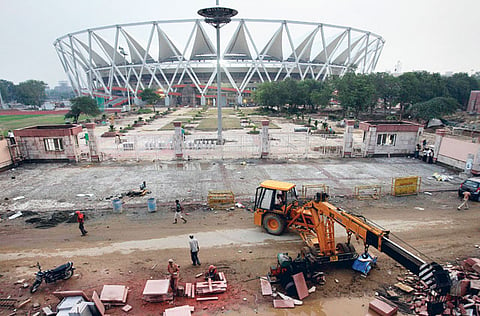India's reputation is at risk
Commonwealth Games have highlighted ineptitude, chaotic planning and poor implementation

Three years ago, an old school-friend of mine in Mumbai bragged that the Commonwealth Games, to be held in New Delhi in October 2010, would be India's answer to China's Olympic Games.
China's Olympics, by and large, went off pretty well.
The same friend was fuming when I met him again last week. He rued the failure of the country's politicians to use the Games to prop up India's image as a leading power with the ability to stage spectacular international events.
The Games have become almost synonymous with rampant corruption which threatens to undo India's economic progress and destroy investor confidence.
India's tragedy is that it is run by a set of ruthless, self-serving politicians whose only reason for joining the profession, if profession is the right word, is to amass quick wealth. Corruption, once considered a shameful, un-Indian phenomenon, is becoming something of a tradition that is ubiquitously present in the daily life of an average Indian.
The tragedy is compounded by the disinterest or indifference displayed by educated and visionary Indians many of whom, despite their brilliant minds and integrity, are unable or unwilling to challenge the old guard of politicians and bring order to a ‘grab-what-you-can' Wild West atmosphere.
The middle-class, which in many democratic societies plays an active role in shaping the future of a country by articulating the needs of society to the ruling political class, has largely remained inconsequential in reducing or eliminating corruption in India.
The Games, by virtue of their high-profile international character, have fetched India international criticism and harmed its image as an aspiring economic superpower.
The Games, which will bring together some 53 nations formerly belonging to the British Empire, have provided a ‘feast of corruption', to borrow a screaming headline from an Indian daily, for politicians, bureaucrats, private companies and contractors who, in a joint effort, were supposed to create an ultra-modern, beautified and well-organised setting in New Delhi for the Games.
However, New Delhi's face, as of last week, appeared completely scarred with huge, gaping holes, the budgets for setting up the massive infrastructure and other needs keep escalating every day, and both the Central and Delhi governments look lost and unable to clearly demonstrate as to who really is in charge of the projects that are moving at a painfully slow pace with less than a month for the Games to start on October 3.
Corruption
Not a day passes without new scandals coming to light. Shady operators have been given huge contracts without proper tenders and due diligence. Much of the equipment for the Games, including sports equipment, was leased at costs far above the purchase price.
Parts of some of the shabbily-constructed halls for sports events have collapsed as a result of hastily completed buildings. The entire costs for organising the Games, according to unofficial estimates, have spiralled from the government estimate of some $500 million to more than $6 billion.
Many critics ask why work on the Games, which India bagged in 2003, got started only two or three years ago, resulting in higher costs. Indeed, the financing of the Games is symptomatic of the crisis of corruption that is plaguing India.
India's IT entrepreneurial icon Azim Premji was right when he recently said that India's growth would have been much higher if the government could have controlled corruption.
India's position in Transparency International's index of corruption in individual countries slipped from 72 in 1999 down to 84 in 2009. In Transparency's ranking, India scored a mere 3.4 index points; corruption-free nations, on the other hand, score over nine points.
Even if the entire infrastructure is completed on time, the Games have got India the wrong kind of international attention: they have not only highlighted the ineptitude and chaotic planning and implementation, but also opened the world's eyes to corruption.
It would be sad if India, whose promising economy for some is even more attractive than that of China, was bypassed in favour of other contenders such as the 500-million consumer strong Asean region. India's leadership needs to firmly crack down on corruption which can derail India's economic progress.
Manik Mehta is a commentator on Asian affairs.


